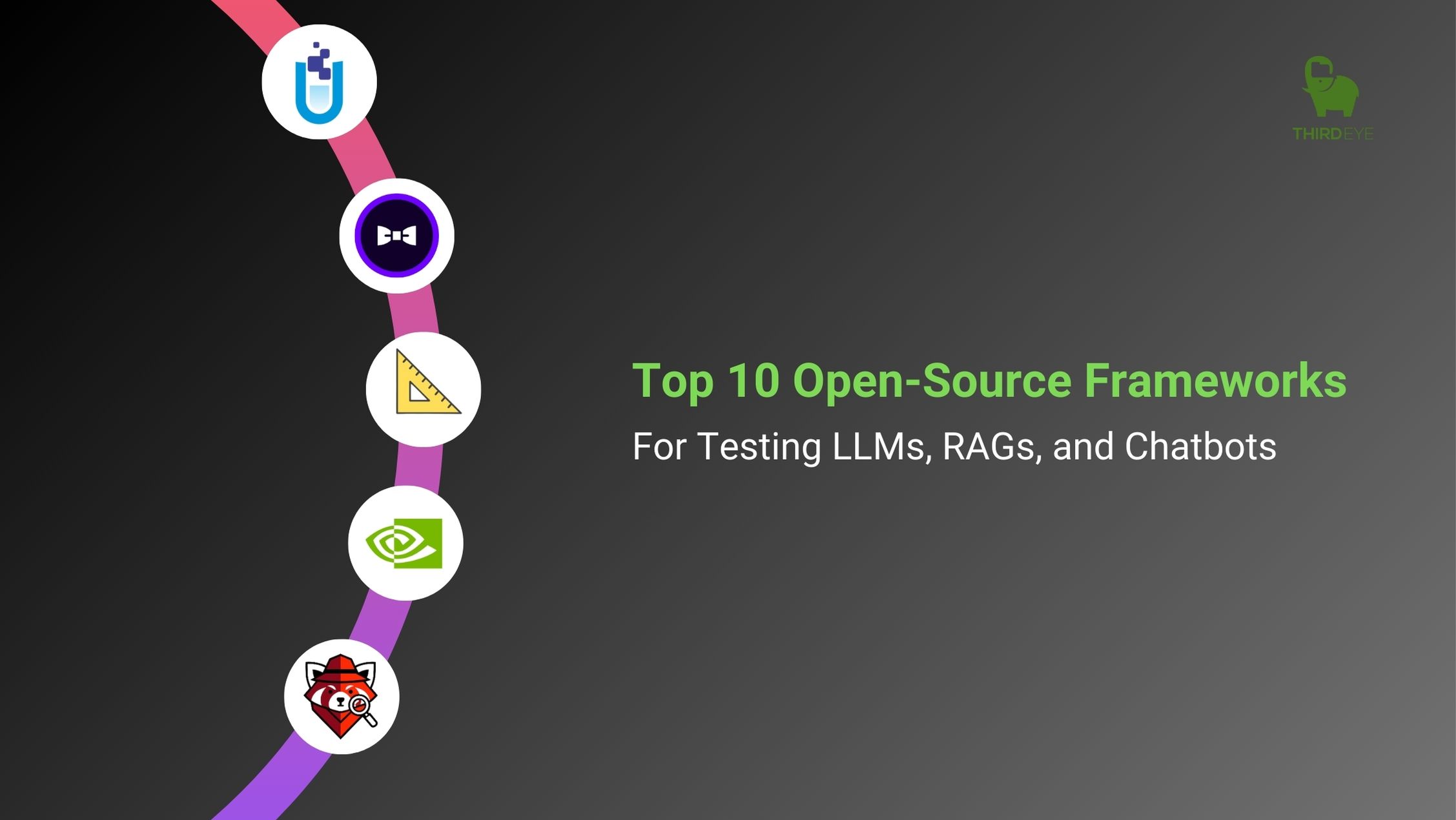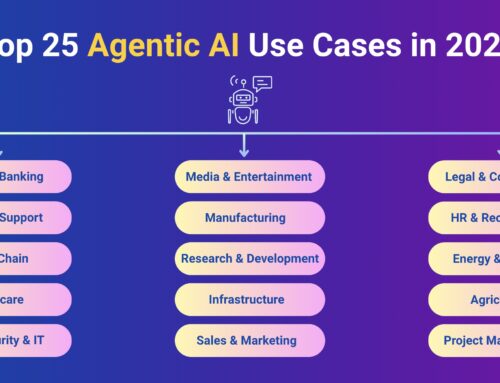Top 10 Open-Source Frameworks for Testing LLMs, RAGs, and Chatbots
According to a recent report by the Wall Street Journal, around 80% of enterprises use Language Models (LLMs), Retrieval-Augmented Generation (RAG) systems, and chatbots in their operations. The same has been confirmed by Gartner.
As the adoption of these AI technologies accelerates, robust testing frameworks have become indispensable for ensuring accuracy, fairness, and reliability. In this article, we will unveil the top 10 open-source testing frameworks that can evaluate and optimize AI models across various dimensions.
LangTest
Owning Company:IBM
Description:LangTest is an open-source framework for evaluating NLP models. It focuses on robustness, fairness, and bias detection, making it ideal for testing LLMs and chatbot systems.
Pros:
- Identifies fairness and bias issues in models.
- Supports adversarial testing to enhance model robustness.
- Easy to integrate into CI/CD pipelines.
Cons:
- Limited pre-built datasets for specific tasks.
- It may require custom configuration for unique NLP tasks.
Usage Areas:
- Testing LLM-based chatbots for robustness.
- Bias and fairness evaluation for enterprise-grade NLP systems.
Compatible Environments:
- Works with Python-based NLP frameworks.
- Supports integration with OpenAI, Hugging Face models.
Pricing:Free (Open Source)
Repository:LangTest GitHub
DeepEval
Owning Company:Open-Source (Community-Driven)
Description:DeepEval provides a lightweight framework to benchmark LLMsfor accuracy, consistency, and output relevance. It’s useful for evaluating chatbot-generated responses.
Pros:
- Flexible and easy to set up for LLM and chatbot testing.
- Supports multiple evaluation metrics such as BLEU, ROUGE, and accuracy.
Cons:
- Limited advanced testing capabilities for bias and robustness.
- It is still evolving with fewer pre-built test cases.
Usage Areas:
- Performance benchmarking of LLM-generated text.
- Testing chatbot response accuracy and relevance.
Compatible Environments:
- Python-based environments.
- Works with OpenAI, Hugging Face, and other generative models.
Pricing:Free (Open Source)
Repository:DeepEval GitHub
LM Evaluation Harness
Owning Company:EleutherAI
Description:LM Evaluation Harness is a comprehensive framework for evaluating language modelsusing standardized NLP benchmarks. It supports a wide range of open-source LLMs.
Pros:
- Extensive support for standardized NLP benchmarks.
- Works with popular LLMs such as GPT-Neo and GPT-J.
- Highly customizable for domain-specific tasks.
Cons:
- The steeper learning curve for beginners.
- Benchmarking large models may require significant computing resources.
Usage Areas:
- Evaluating LLMs against standard NLP tasks.
- Model comparison across open-source LLM ecosystems.
Compatible Environments:
- Python environments.
- Open-source LLMs like GPT-Neo, GPT-J, and more.
Pricing:Free (Open Source)
Repository:LM Evaluation Harness GitHub
RAGAS (Retrieval-Augmented Generation Assessment System)
Owning Company:ExplodingGradients
Description:RAGAS is built to evaluate retrieval-augmented generation (RAG)systems. It provides metrics for assessing retrieval relevance, grounding, and output correctness.
Pros:
- Tailored specifically for RAG-based applications.
- Includes metrics like retrieval relevance and faithfulness.
Cons:
- Limited functionality outside of RAG systems.
- Requires proper grounding datasets for effective evaluation.
Usage Areas:
- RAG pipeline quality assurance.
- Evaluating grounding and faithfulness of generated outputs.
Compatible Environments:
- Python-based ecosystems.
- RAG pipelines integrating with LLMs (e.g., OpenAI, LangChain).
Pricing:Free (Open Source)
Repository:RAGAS GitHub
TextAttack
Owning Company:QData
Description:TextAttack is a powerful open-source library for adversarial testingand benchmarking NLP models, including chatbots and LLMs.
Pros:
- Supports adversarial perturbations for testing robustness.
- Compatible with pre-trained models from Hugging Face.
- Includes datasets for multiple NLP tasks.
Cons:
- Resource-intensive for large-scale testing.
- Requires familiarity with adversarial testing techniques.
Usage Areas:
- Robustness testing for chatbot models.
- Identifying vulnerabilities in LLM responses.
Compatible Environments:
- Python, Hugging Face transformers.
- Works with OpenAI and other NLP libraries.
Pricing:Free (Open Source)
Repository:TextAttack GitHub
Promptfoo
Owning Company:Community-Driven
Description:Promptfoo is a testing framework for prompt engineeringand evaluating the performance of prompts in LLM-based systems.
Pros:
- Simplifies prompt comparison across datasets.
- Offers easy-to-use dashboards for evaluating performance.
Cons:
- Limited to prompt engineering evaluation.
- Featured with a few pre-built prompts for specific industries.
Usage Areas:
- Testing prompts for LLM-based chatbots.
- Fine-tuning RAG prompts for optimal results.
Compatible Environments:
- Python-based environments.
- OpenAI GPT, Hugging Face models.
Pricing:Free (Open Source)
Repository:Promptfoo GitHub
EvalAI
Owning Company:CloudCV
Description:EvalAI is an open-source platform for creating, running, and evaluating custom AI challengesfor benchmarking AI models.
Pros:
- Highly scalable for custom benchmarks and competitions.
- Supports team-based evaluations and leaderboards.
Cons:
- Requires setup and hosting for large-scale tasks.
- It is suited for competitions rather than one-off testing.
Usage Areas:
- Running NLP and chatbot evaluation challenges.
- Benchmarking AI systems across teams.
Compatible Environments:
- Cloud-hosted or on-premise environments.
- Supports OpenAI, Hugging Face, and custom models.
Pricing:Free (Open Source)
Repository:EvalAI GitHub
Triton Inference Server
Owning Company:NVIDIA
Description:NVIDIA Triton Inference Server is an inference platform that tests and benchmarks LLMs for performance, latency, and scalability.
Pros:
- Optimized for large-scale model deployment.
- Real-time performance monitoring.
Cons:
- Requires NVIDIA GPUs for full optimization.
- The steep learning curve for configuration.
Usage Areas:
- Latency and throughput testing for LLM APIs.
- Scalable deployment of chatbot models.
Compatible Environments:
- NVIDIA GPUs, cloud services.
- It supports TensorRT, PyTorch, ONNX, TensorFlow.
Pricing:Free (Open Source)
Repository:Triton GitHub
OpenPrompt
Owning Company:THUNLP
Description:OpenPrompt is a flexible library for prompt tuning and evaluationin LLM-based systems, offering extensive template testing for NLP tasks.
Pros:
- Supports multiple prompt strategies.
- Works with pre-trained language models.
Cons:
- Limited support for real-time chatbot evaluations.
Usage Areas:
- Prompt-based model tuning and testing.
Compatible Environments:
- Hugging Face, OpenAI, GPT-like LLMs.
Pricing:Free (Open Source)
Repository:OpenPrompt GitHub
HEval
Owning Company:Community-Driven
Description:HEval provides human-centered evaluation for chatbot testing, combining automated metrics with human feedback for LLM-generated outputs.
Pros:
- Combines automated testing with human-in-the-loop evaluations.
Cons:
- Requires manual setup for human evaluation workflows.
Usage Areas:
- Real-world chatbot performance validation.
Pricing:Free (Open Source)
Repository:HEval GitHub
Conclusion
By leveragingthese frameworks, organizations can ensure robust performance, fairness, and reliability of their LLMs, RAG systems, and chatbots across diverse applications.





